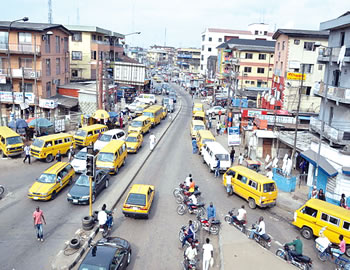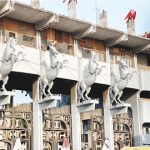Everyone agreed the spirit can’t just be right. LANRE ADEWOLE, LEKAN OLABULO and NAZA OKOLI undertook a search for the force propelling the uniquely-notorious Ojuelegba’s spirit.
Once upon a time, the Devil (call him satan if you like) had its permanent abode in a town which was eventually harnessed into what is today known as Lagos State. Though its abode was invaded by men who got it physically supplanted, its spirit appears not to have left the town. In fact, it was as if human beings went to look for bigger trouble by trying to displace the Devil from its physical abode, because instead of operating from a particular spot with minimal capacity for evil and damage, the invasion which now makes its amorphous, has expanded its territory of evil since it now hangs in the firmament, refusing to quit, operating in the spirit, causing more grievous harm and ultimately being implacable.
Have you ever wondered why Ojuelegba, a hitherto separate town, now a sprawling community in Surulere, has remained notorious as the axis of evil in Lagos State, as long as humanity in the state can remember? Don’t get into a prolonged head scratching. The Devil once lived there and has obviously refused to move home. When it took up residency, its presence was said to be totally dominant that the town had to be named after it. Before the shortened, funkified form of the name ‘Ojuelegba’ came to be, it was originally Ojubo-Elegbara (the shrine of Elegbara, who in Yoruba cosmology, means esu or Devil in English language while Ojubo means home or shrine of a deity).
So, how did Ojuelegba get its name? According to Jeremy Weate and Bibi Bakare Yusuf in a study titled “Ojuelegba: The Sacred Profanities of a West African Crossroad,” Esu has always been the principal deity of the original land owners of Lagos, the Aworis. The researchers continue: “As the principal crossroads in Lagos, Ojuelegba soon became the consecrated site for the worship of Esu. Prior to urbanisation, Ojuelegba had the “stone” of atonement, made of lateritic earth with cowrie shells marking the eyes and mouth of Esu in which cult officials pour daily offerings of palm oil to maintain’s Esu’s problematic coolness. With increasing congestion at Ojuelegba, Elegba cult officials decided to move the shrine to its current site on Apapa road, where the worship of Esu continues to this day in relative peace, and the descendants of the Awori fishermen remain at their trade. Till the present time, each Sunday, devotees of Elegba (no longer purely Aworis) congregate to worship the god of threshold.”
Even for those who had never visited Lagos, Ojuelegba holds a special “evil” appeal. Whether years back or now, the town has held tightly to the number one spot on notoriety table, with every evil imaginable not only possible but also commonplace.
On Monday, 27 June 2016, a Twitter user, Kehinde (@kenny_O), tweeted: “My guy and three other people got robbed at gunpoint in broad daylight at Ojuelegba today and no one tried to get help. People were just watching.”
Just like New York in America with its peculiar notorious spirit, the experience narrated above depicts just one of the numerous evil possibilities in Ojuelegba with its satanic spirit.
The town keeps changing, but not in spirit content. It now has many churches and mosques, but the spirit of “satan” still reigns supreme. To many people, the Devil has continued to play a major role in determining what happens therein, despite the coming of modernity that got its former abode transformed into one of the most popular bridges in the state.
Or how does one explain why the Devil had to be appeased before constant road carnage, cult killings, armed robberies and other tragedies could stop. The traditional people in Ojuelegba have a very strong belief that the refusal of one of the former traditional rulers in the town, to continue with the regular appeasement of Esu —the Devil was responsible for the tragedies in the area .
In actual fact, the people of Ojuelegba, supported by the government and some senior police officers appeased the evil one recently as a way of putting an end to the constant tanker and other trick accidents on the Ojuelegba bridge, a resident told Saturday Tribune.
And to think it was the same human beings that first sacked “satan” from his abode!
Ojuelegba of the 70s and 80s used to be notorious for prostitution – the great Empire, the largest concentration of sex workers in Nigeria, has for over the years maintained its position. The city also was at the forefront of nightlife, gambling and other vices. It is however necessary to point out that the city also attracted positive development like the National Stadium and other national monuments. But you want to ask, at what cost?
‘Why the Devil wreaks havoc here’
Oluwo Olanrewaju Ajala Ajamajebi, the Olori Oluwo Ogboni Abalaye Fraternity Association of Nigeria is no doubt an authority when it comes to culture and tradition of the indigenes of Ojuelegba. Oluwo Abalaiye, popularly known as Oluwo Taju, while speaking to Saturday Tribune, insisted that contrary to the belief of many people that Esu is evil, Elegba in Ojuelegba as the Devil is regarded, “brings peace and tranquility to the Lagos community.”
According to Oluwo Taju, Ojuelegba used to be one of the communities under the mainland of those days and that it was during one of the efforts to liberalise and develop the town that they were referred to Elegba, which was sited under the present Ojuelegba under bridge.
He narrated that “ Ojuelegba was one of the communities under the Lagos Mainland ,during the days of our forefathers . The settlers at that time were told that there was already a deity in existence and that they should go and search for it. Hunters were drafted to go and search for the deity and it was located directly under the present Ojuelegba Bridge. At that time there was no bridge in that area. The name was coined from the spot, where the deity was located. The deity was identified as “Elegba” the devil. The spot where it was found is the “Oju Elegba.” Elegba became the major deity of the community. It was always being referred to for any spiritual assignment at that time and people began to worship it . Some people call it Elegba . Others call it Elegbara.”
Oluwo Taju also insisted that the Elegba of those days is still in existence. According to him, “Yes, it is still in existence. The first traditional ruler at that time really worshipped it and appeased it from time to time but the next Baale dissociated himself from Elegba. The deity was relocated and a new shrine was built for it. People stopped appeasing it, where it was relocated. They did not know how to appease Elegba. Then, the problems started. Some government functionaries,including an assistant commissioner of police called me to find a lasting solution to the problem and the Ifa divination was contacted and it was revealed that the problem was as a result of the neglect of the Elegba deity. I told them that I had warned the community for about 10 years. When they got to the shrine around the bridge,the deity was no more there. We had to appease the deity to stop the constant accident on the Ojuelegba bridge. Cases of cult killings, and diseases have also become a thing of the past as a result of the appeasement to the Elegba deity.”
Apart from the Elegba shrine, which was demolished as a result of the construction of the bridge, the town’s main Iledi at Masha has also paved the way for a modern drainage system. Edan and other deities, which were kept in the iledi were also abandoned.
May God deliver me–Monarch
Chief Awoyemi also stated that some of the major communities that form the then Ojuelegba – the seven Obeles, had gone into extinction. He also said that, apart from the Elegba shrine, which had paved the way for modern development, the former Eid prayer ground has also become a thing of the past in Ojuelegba .
The spirit of the city
Ojuelegba is one of the most densely populated areas in the state. Most of its buildings are old. Shops, apartments and offices are clustered together and sited so close to the road that a visitor walking through the streets might feel a choking sensation. Most of its inhabitants are young, unemployed people who loiter the streets day and night.
Though Tuesday, July 5 was a public holiday when Saturday Tribune visited, hundreds of people were seen at the town’s major bus stop, the intersection under the bridge with connecting links to Surulere, Yaba and Ikorodu Road. At the side of Itire Street, close to 50 young men were gathered; it looked as though a fight was about to start.
Ojuelegba is a puzzle on many counts. For instance, there are as many betting centres as there are ‘Bible schools’ and ‘Christian bookshops’ around the vast area that is called “Under Bridge”. Along the streets are churches of various denominations, many of them on the same block as liquor houses.
Cursed?
It is not clear what Ojuelegba is most known for. It is an eminently famous part of the city’s mainland, but it is not often spoken of in glowing terms. People mention the town when they talk about drug dealing, cult fights and armed robbery.
The town is rich in legends and folk tales. By far the most pervading of these is the belief that of being home to Esu – the peddler of deceit. Indeed, many believe that it is the town’s connection with this “dark history” that is responsible for all the evil daily witnessed in the area today.
At Ojuelegba branch of the Mountain of Fire and Miracles Ministries (MFM), a deliverance session was on. Pastor Lanre Justus Olanrewaju, a tall, soft-spoken gentleman, excused himself from the meeting.
“There is an evil spirit at work at Ojuelegba,” he told Saturday Tribune. “It is the spirit of Ojuelegba. It is the spirit that controls here. However, it does not disturb us as christians because once you are in Christ, you are protected. You can pray yourself out of any problem.
“There is something we call territorial mapping. It means going where there are shrines and praying over them in order to destroy the evil power at work there. We don’t do this while the priests or worshippers of the deities are there; so we usually choose the night, to avoid unnecessary confrontation.”
For Sheikh Ismail Busayry, a Muslim cleric in the area who spoke to Saturday Tribune over the phone on Thursday, the legendary has a lot in common with Satan and Shaitan of the Christian and Islamic religions respectively.
“There is the belief that there was someone called Esu, just like Ogun, and other gods. Esu symbolises evil. Even in the Bible and the Quaran, we have Satan and Shaitan. They are almost the same. We believe he was the one that was responsible for the way Adam was sent out of the Garden of Eden. So, Esu or Devil or Satan or Shaitan symbolises evil. Even when Cain killed Abel, he said he was guided by the spirit of Satan. Again, when the wife of the King of Egypt seduced Joseph, we are told Esu or Satan was responsible.
“Well, we never can say whether it really began here. As I have said, this Devil or Esu has been in existence since the beginning of creation. Again, there are other Esu shrines in other parts of Yorubaland. But that is not really relevant. The important thing is that we have Esu worshippers here, and because of that there is evil in this area. How can you not expect evil in a place like this?”
A legacy of madness
But the story of the worship of Esu at Ojuelegba has been the subject of much research. Jeremy Weate and Bibi Bakare Yusuf (earlier cited), for instance, found that the designation of Ojuelegba as the centre of Esu worship dated back to the seventeenth century or earlier.
“Ojuelegba literally means the “eye” or “shrine” of Elegba. It is the site where sacrifice was made to Esu Elegbara, the Yoruba divinity and trickster figure carrying messages between this world and the celestial sphere.”
“Amidst the multidimensional profanity, Ojuelegba also functions as a shrine dedicated to the spirit of Esu-Elegbara (translating as ‘Esu the powerful one’), commonly known as either Esu or Elegba…. Esu is the orisha of the mixed message, distant cousin (across the ocean) to Hermes, the Greek god of garbled meaning, potentiality, plurality, and paradox. Sometimes he takes the form of a creature wielding a large stick. At other times, he is a tiny being that needs to “tiptoe to put salt in the soup”. At all times, he embodies exchange and paradox: he is both the first born and the last born; at once an old man and a child, and both cunning and capricious. At times, Esu appears as an aggressive copular god. Elsewhere, he becomes a beautiful woman, or a bisexual figure… he is a thief, a trickster and a transformer: turning nonsense into sense and back again.”
Gunpoint.
Many others who spoke to Saturday Tribune earlier in the week were doubtful that there was any “supernatural force” at work in the area, choosing instead to blame the government and security agencies for their inability to make the town safe.
Agboola Samson who used to live in the area in the past told Saturday Tribune that he remembered only the shrine.
“No, the place is not cursed,” he said. “There used to be an Esu shrine there; it’s called “ojo no esu”. But that doesn’t mean the whole place is cursed.”
At one of the bus stop shelters, an old man, Mr Jide Martins, sat, clutching a small radio set. Formerly a cab driver, he told Saturday Tribune he suffered a stroke after his cab was snatched from him at Ojuelegba.
“I used to be a cab driver,” he said. “But after my cab was snatched from me last year, I had a partial stroke. I am better now. I was healed during a miracle meeting at my church.”
“Our problem here is Esu. It is an evil spirit. It is going round cursing people, making them do evil. Maybe it’s because of the bus parks. All these boys that work for the buses… they are evil. They are evil themselves.”
Fela on Ojuelegba
Dem be three men wey sell for roadside-o
Dem three speak different language-o
Dem speak Lagos, Accra, and Conakry
One white man come pay them money –o
He pay them for pounds, dollars and French money-o For the thing wey he go buy from them
He remain for them to share am-o Me I say, na confusion be that-o […]
Ojuelegba, Ojuelegba
For Ojuelegba
Lagos city, Surulere, ogoro center For ojuelegba, for ojuelegba
Moto dey come from south
Moto dey come from north
Moto dey come from east
Moto dey come from west
And policeman no dey for center Na confusion be dat-o…
Additional information: Weate & Yusuf, 2003







